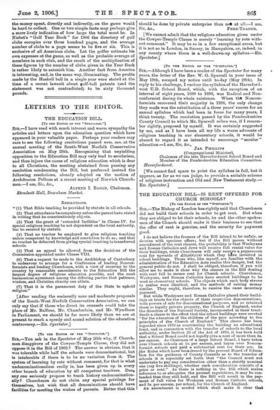LETTERS TO TII P EDITOR.
THE EDUCATION BILL.
[TO THE EDITOR OP THE "SPECTATOR.'']
SIR,—I have read with much interest and warm sympathy the articles and letters upon the education question which have appeared in your valuable paper. Perhaps your readers may care to see the following resolutions passed nem. con. at the annual meeting of the South-West Norfolk Conservative Association on May 28th. Recognising that unyielding opposition to the Education Bill may only lead to secularism, and thus injure the cause of religious education which is dear to all Christians, the meeting abstained from passing any resolution condemning the Bill, but preferred instead the following resolutions, already adopted on the motion of Archdeacon Pelham at a recent meeting of Norwich Church- men.—I am, Sir, &c.,
RESOLUTIONS.
" (1) That Bible teaching be provided by statute in all schools.
(2) That attendance be compulsory unless the parent have stated in writing that he conscientiously objects.
(3) That the grant of 'extended facilities' in Clause IV. for special religious teaching be not dependent on the local authority, but be secured by statute.
(4) That no teacher be employed to give religions teaching unless competent by knowledge and conviction to do so; and that no teacher be debarred from giving special teaching in transferred schools.
(5) That an appeal be allowed from the decisions of the Commission appointed under Clause VIIL
(6) That a request be made to the Archbishop of Canterbury to endeavour to arrange for a Conference of leading Noncon- formists and leading Churchmen, with a view of securing to the country by reasonable amendments to the Education Bill the largest degree of religious education possible, and the most harmonious agreement among the differing parties that patience, wisdom, and Christian charity can attain.
(7) That it is the paramount duty of the State to uphold religion."
[After reading the eminently sane and moderate proposals of the South-West Norfolk Conservative Association, we can only say that if those who direct its counsels could take the place of Mr. Balfour, Mr. Chamberlain, and Mr. Wyndham in Parliament, we should be far more likely than we are at present to reach a speedy and sound solution of the education controversy.—En. Spectator.]






































 Previous page
Previous page